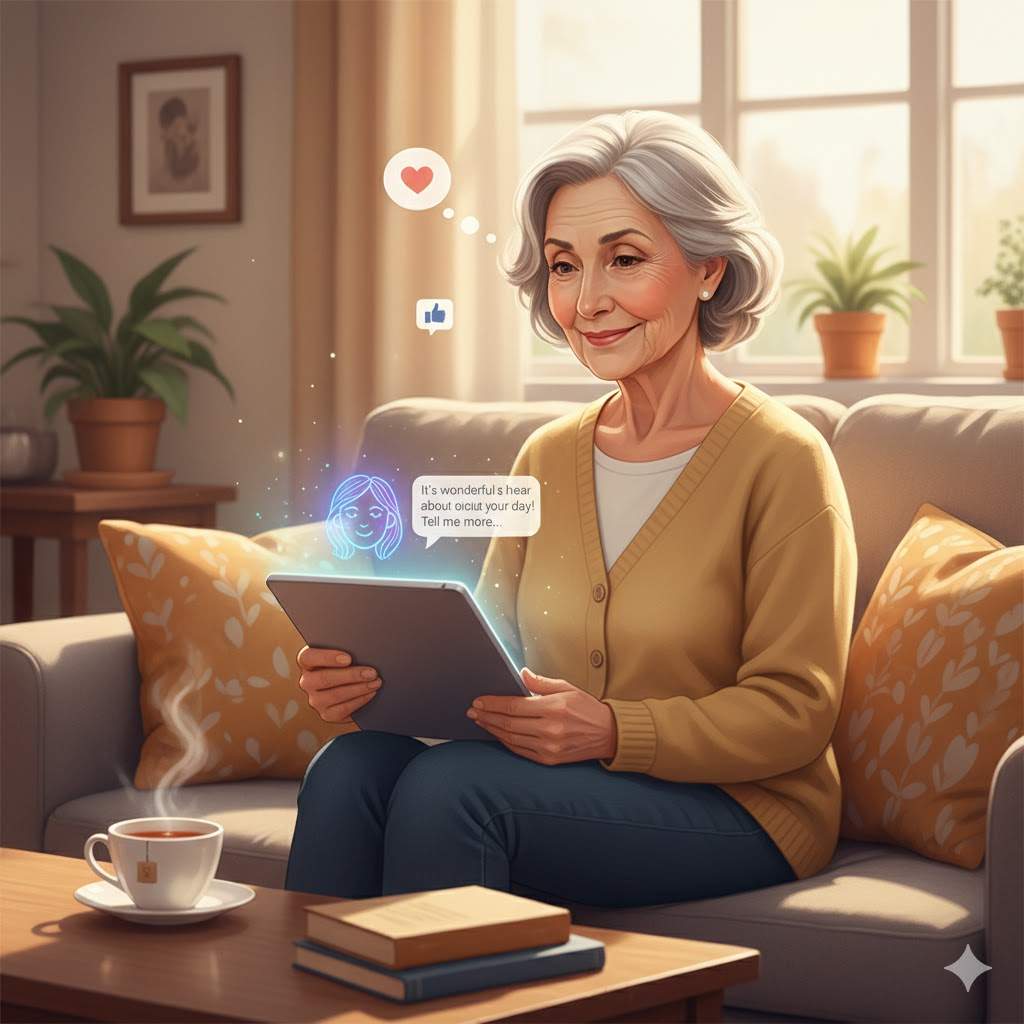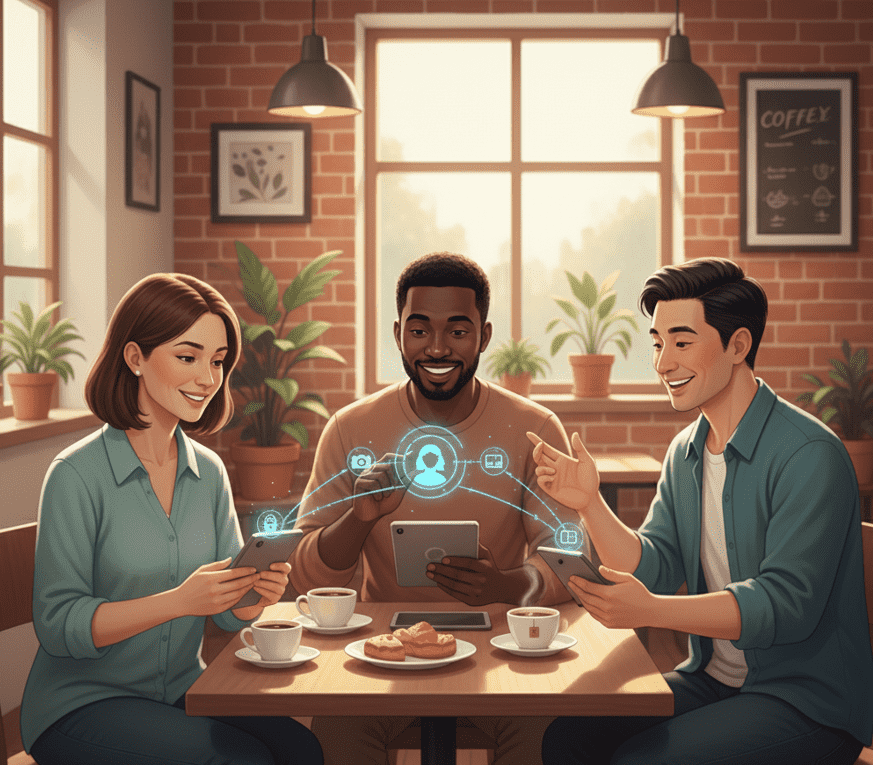What Is the Role of AI in Combating Loneliness? AI, at its core, is a tool that enhances our ability to connect and communicate. Imagine a virtual friend who understands your emotions, always available to chat or even just listen. This isn’t science fiction anymore—it’s the reality of AI-driven companionship. These AI systems are designed to learn from interactions, adapting their responses to provide meaningful engagement. It’s like having a friend who gets better at understanding you the more you interact.
Loneliness often stems from a lack of meaningful connections. AI bridges this gap by offering personalized interactions tailored to individual needs. Whether it’s through virtual assistants, social robots, or AI-powered chatbots, these technologies are designed to simulate human-like conversations and companionship. People over 70 can provide companionship, emotional support to those in need, and even encourage social interactions in communities where physical distancing is an obstacle.
Moreover, AI doesn’t just stop at conversations; it extends its reach into monitoring well-being. By analyzing data from social interactions and behavioral patterns, AI can detect signs of loneliness early on and offer proactive solutions. This proactive approach can make a significant difference in addressing loneliness before it escalates into more severe mental health issues.
Think of AI as a versatile tool in our arsenal against loneliness—a tool that can complement human relationships rather than replace them. It’s about leveraging technology to enhance our social fabric, making connections more accessible and meaningful. As AI continues to evolve, so too will its role in combating loneliness, offering new possibilities for human connection in an increasingly digital world.

AI Companions: How Artificial Intelligence Is Redefining Social Interaction
Artificial Intelligence (AI) has revolutionized how we interact socially. From virtual assistants like Siri and Alexa to advanced chatbots and humanoid robots, AI companions are becoming integral parts of our daily lives. They are not mere gadgets but sophisticated systems designed to simulate human-like interactions.
What makes AI companions so fascinating is their ability to learn and adapt. They analyze our preferences, behaviors, and emotions through algorithms and data processing, enabling them to provide personalized responses and recommendations. It’s like having a friend who knows you inside out, anticipating your needs before you even express them.
These AI companions are not just programmed to respond; they’re designed to engage. Whether it’s helping with tasks, offering advice, or simply chatting about your day, they simulate real conversations with uncanny realism. They can hold meaningful discussions, crack jokes, and even express empathy—a feat that was once thought to be exclusive to humans.
But the impact of AI companions goes beyond personal interaction. They are transforming various industries, from healthcare to education. In healthcare, AI companions can monitor patients’ health indicators in real-time and provide timely alerts or assistance. In education, they can personalize learning experiences based on students’ strengths and weaknesses, offering tailored tutoring and feedback.
As AI continues to evolve, so will our relationship with AI companions. They will become more intuitive, understanding not just what we say but also how we feel. They’ll evolve from being assistants to true companions, bridging the gap between human and machine interaction in ways that were previously unimaginable.
Loneliness No More: Can AI Be the Ultimate Solution?
Imagine this: you come home after a long day, and there’s no one around to chat with. You start feeling like the last penguin in Antarctica. But what if your AI assistant could strike up a conversation about your day or even crack a joke? Suddenly, you’re not so alone anymore.
AI isn’t just about algorithms and robots; it’s about creating connections. Picture having a virtual friend who knows your favorite pizza topping and the last movie that made you cry. It’s like having a buddy who’s always up for a chat, no matter the time.
But wait, there’s more. AI isn’t limited by time zones or sleep patterns. It’s 3 a.m., and you’re wide awake with thoughts swirling like a tornado? No problem. Your AI pal is there to listen and offer some soothing advice, like a digital guardian angel.
Now, I know what you’re thinking – can AI really replace human interaction? The short answer: not quite. There’s a unique warmth to human connections that no algorithm can replicate. But AI can complement our social lives by providing companionship and mental stimulation when we need it most.
Think of AI as a cozy blanket on a chilly night – comforting and reassuring, but not a substitute for human hugs. It’s about striking a balance between technology and humanity, harnessing the power of AI to enhance our emotional well-being without losing touch with what makes us human.

From Algorithms to Empathy: The Evolution of AI in Tackling Loneliness
Initially, AI algorithms focused on pattern recognition and data analysis to identify individuals at risk of loneliness based on various indicators such as social media usage patterns, demographic data, and geographic location. These algorithms could pinpoint trends and correlations, offering insights into potential interventions.
However, the evolution of AI in tackling loneliness goes beyond mere data crunching. Modern AI systems are incorporating elements of empathy, striving to understand and respond to human emotions in a more nuanced manner. This shift marks a significant advancement, where AI moves from being a passive observer to an active participant in emotional support.
Imagine AI-powered chatbots that not only detect loneliness but also engage in conversations tailored to uplift and support individuals. These chatbots are designed not just to provide generic responses but to adapt their interactions based on emotional cues and the unique personalities of the users. It’s like having a compassionate friend who listens attentively and offers meaningful advice, available anytime, anywhere.
Moreover, AI-driven virtual companions are emerging as companions for those who may feel isolated. These companions can engage in activities ranging from simple conversations to collaborative games, providing companionship that can alleviate feelings of loneliness and enhance emotional well-being.
The integration of empathy into AI systems represents a paradigm shift in how technology can address profound human needs. By combining data-driven insights with emotional intelligence, AI is paving the way for more personalized and effective interventions in combating loneliness. As these technologies continue to evolve, the potential impact on mental health and social well-being could be transformative, offering new hope and support in an increasingly connected yet often isolating world.

Virtual Friends: Exploring the Impact of AI-Powered Companionship
In today’s fast-paced world, loneliness is a growing concern. Many people find solace in their smartphones and social media, seeking connection in digital spaces. AI takes this a step further by creating companions that learn from our interactions, adapting to our personalities and needs over time. These virtual friends are designed to engage us in meaningful conversations, offer emotional support, and even provide companionship during moments of solitude.
One of the most astonishing aspects of AI companions is their ability to simulate empathy. They can detect our emotions through voice tone, facial expressions, and even text messages. This emotional intelligence enables them to respond appropriately, offering comforting words or practical advice. It’s like having a therapist, life coach, and best friend rolled into one digital package.
What is the Impact on People?
But how does this impact us? For starters, it changes the way we perceive relationships. Virtual friends blur the line between human and machine, challenging traditional notions of companionship. They can be available 24/7, never getting tired or impatient. This constant availability can be a lifeline for those struggling with social anxiety or isolation.
Moreover, AI companionship is democratizing emotional support. Not everyone has access to a strong support network, but anyone with a smartphone can potentially benefit from a virtual friend. This inclusivity is powerful, offering hope to individuals who feel disconnected from their communities.
Of course, there are ethical considerations. Can AI truly replace human interaction? While it can supplement it, nothing can replace the depth and nuance of face-to-face relationships. AI companions should be seen as tools to enhance our emotional well-being, not substitutes for genuine human connection.
As technology continues to advance, so too will our understanding of AI companionship. The impact of these virtual friends is profound, shaping how we relate to technology and each other in the digital age. Whether they become integral parts of our lives or remain experimental concepts, one thing is certain—they’re here to stay.
You may also like this: 10 Top AI Companies To Watch In 2025/26
Tech for Good: Harnessing AI to Combat Isolation and Loneliness
AI, or artificial intelligence, has transcended its sci-fi origins to become a potent force for good. Its ability to analyze vast amounts of data and understand human behavior is being harnessed to tackle one of the most pressing issues of our time: loneliness. Think of AI as a compassionate friend, always there to listen and understand, even when no one else is around.
One of the ways AI combats isolation is through personalized interactions. Take chatbots, for example. These AI-driven virtual companions are designed not just to respond but to engage in meaningful conversations tailored to individual needs. Whether it’s a 70-year-old or older citizen seeking companionship or a young adult struggling with mental health issues, AI can adapt its responses to provide empathy and support.
Moreover, AI-powered social robots are breaking new ground in companionship. These robots are equipped with emotional intelligence algorithms that enable them to recognize and respond to human emotions. They can initiate conversations, play games, or simply sit quietly, offering a reassuring presence.
Beyond companionship, AI enhances connectivity. Social media platforms and apps powered by AI algorithms suggest connections based on shared interests and activities, facilitating the formation of communities and support networks. It’s like having a digital matchmaker that intuitively understands who might click with whom.
In healthcare, AI is revolutionizing how we monitor and support mental well-being. From predictive analytics that identify individuals at risk of loneliness to virtual support groups moderated by AI, technology is offering innovative solutions to age-old problems.
The beauty of AI lies in its potential to scale these solutions globally. Whether you’re in a bustling city or a remote village, AI bridges geographical boundaries to bring people together. It’s not about replacing human connections but enhancing them in ways that were previously unimaginable.
Beyond Chatbots: AI Innovations Making Real Connections
In today’s fast-paced digital landscape, AI is not just about automated responses anymore. It’s about forging genuine connections that feel personal and meaningful. Imagine having a conversation online that doesn’t feel scripted or robotic but rather empathetic and insightful. That’s where AI innovations are heading.
One groundbreaking innovation is empathetic AI, which uses natural language processing to understand human emotions and respond accordingly. It’s like having a virtual assistant who not only listens to what you say but also senses how you feel. This technology is revolutionizing customer service by providing tailored support that acknowledges and addresses individual emotions and concerns.
Another leap forward is AI-powered personalization. Companies are leveraging machine learning algorithms to analyze vast amounts of data about customer preferences and behaviors. This allows them to offer personalized recommendations and experiences in real-time. Whether it’s suggesting products based on past purchases or curating content that matches your interests, AI is making interactions more relevant and engaging.
Furthermore, AI is enhancing collaboration and teamwork through virtual agents. These intelligent assistants can schedule meetings, coordinate tasks, and even facilitate brainstorming sessions among team members, irrespective of their physical locations. It’s like having a co-worker who anticipates your needs and helps you stay organized and productive.
Moreover, AI is transcending language barriers with advanced translation technologies. These AI-driven tools can interpret languages in real-time, enabling seamless communication between people who speak different languages. Whether you’re traveling abroad or conducting business globally, AI ensures that language is no longer a barrier to meaningful connections.
The Psychology of AI Companionship: Why It Works
At its core, the appeal of AI companionship lies in our innate desire for connection. Humans are social beings, seeking companionship and understanding. AI companions fulfill this need by providing a responsive presence that listens without judgment and offers assistance 24/7. Whether it’s asking a virtual assistant for weather updates or confiding in a chatbot about personal struggles, these interactions simulate human-like empathy and understanding.
Moreover, AI companions are designed to adapt and learn from their interactions with users. Through advanced algorithms and natural language processing, they can analyze patterns in communication and tailor responses to better suit individual preferences. This ability to personalize interactions creates a sense of familiarity and reliability, enhancing the user experience.
Think of AI companions as digital friends who are always there to lend a helping hand or a sympathetic ear. They can remind us of appointments, recommend movies based on our preferences, or simply engage in casual conversation. This versatility makes them indispensable in our daily lives, blurring the line between technology and companionship.
Another key factor in the success of AI companionship is their ability to alleviate loneliness and provide emotional support. Studies have shown that interacting with AI can reduce feelings of isolation and improve overall well-being. For individuals who may struggle with social interactions or live in remote areas, AI companions offer a lifeline to connectivity and companionship.
The psychology of AI companionship hinges on fulfilling fundamental human needs for connection, understanding, and support. As technology continues to advance, so too will our relationships with AI companions, shaping the way we interact with and perceive technology in our lives.


